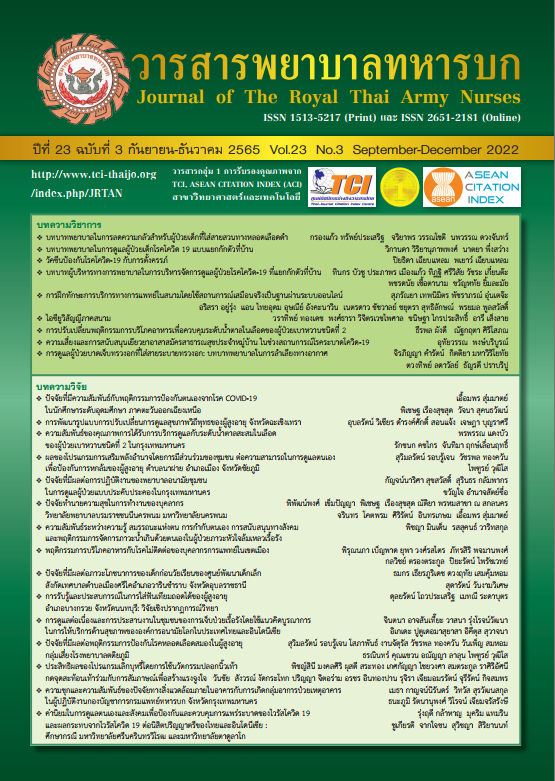Self-love: A Strategy to Unlock Self towards Recovery from Depression in Middle-Aged Women
Keywords:
self-love, recovery from depression, middle-aged womenAbstract
This was grounded theory research, which aimed to study the recovery process from depression from 26 women, aged 40-60years, living in Chonburi Province and having depression diagnosed by psychiatrists. Twenty-one people entered the recovery phase diagnosed by psychiatrists while five of them perceived by themselves. Data were collected by in-depth interviews, observation guideline and field notes informants and analyzed by comparative analysis.
The results showed that the recovery process from depression consisted of 3 phrases: phrases 1 loss and pain, phrases 2 having depression and seeking ways to unlock one’s self and phrases 3 regaining peace of mind. In the second phrase, the core category was found. It was “self-love”, which helped unlock one’s self from the suffering caused by focusing on others until neglecting self- care. Pulling one’s self out of sorrow can be done through the following important steps, namely: 1) throwing away things that cling to the mind - quitting suffering 2) analyzing the causes of suffering - building energy; 3) determining a new path - standing up and living with self-love and 4) creating own meaning to continue living. As a result, women recognized that their identity had returned and recognized their self-esteem. Healthcare providers should be encouraged to have self-love to promote recovery from depression.
Downloads
References
World Health Organization. Depression and other common mental disorders: Global health estimates. Geneva: WHO Document Production Services; 2017.
American Psychiatric Association. Diagnostic and statistical manual of mental disorders: DSM-5™. 5th ed. American Psychiatric Publishing, Inc; 2013.
Teresa F, Bruno G. A brief psychotherapeutic intervention with depressed middle-aged portuguese women. Women & Therapy. 2012; 35:233-47.
Ministry of Public Health, Department of Mental Health. Guidebook of depressive disorders surveillance and care: Provincial Level. 3reved. Prasimahabhodi Psychiatric Hospital; 2014. (in Thai)
Ministry of Public Health, International Health Policy Program. Report on burden of disease and injury of Thai population year 2013. Nonthaburi: The Graffico systems; 2015. (in Thai)
Mahidol University, Ramathibodhi Hospital, Faculty of Medicine, Department of Psychiatry. Using DSM-5. In: Lortrakul M, Sukanicha P, editor. Ramathibodhi Psychiatry. 4th ed. Bangkok: Mahidol University, Faculty of Medicine; 2018. (in Thai)
Rungreangkulkij S. Depression in women. Continuing education in nursing, Vol. 15. Women’s Health Nursing. 2015;1(2):100-43. (in Thai)
Rungreangkulkij S, Chirawatkul S, Kongsuk T, Sukavaha S, Leejongpermpoon J, Sutatho Y. Sex or gender leading to a high risk of depressive disorder in women. J Psychiatr Assoc Thailand 2012;57(1):61-74. (in Thai)
Kheuankaew O. The changing way: gender and equity based on spiritual and learning with heart. Nakhon Pathom: Mahidol University; 2015. (in Thai)
Fullagar L, O’Brien S. Social recovery and the move beyond deficit models of depression: a feminist analysis of mid-life women’s self-care practices. Soc Sci Med. 2014;117: 116-24.
Aroonpongpaisal S, Wasiknanon S. Textbook of depressive disorders. Khon Kaen: Klungnanavitaya printery; 2015. (in Thai)
Chirawatkul S. Development of prevention and treatment system of depressive disorder for mental health policy with gender-sensitive. Research report. Khon Kaen: Khon Kaen University; 2011. (in Thai)
Ministry of Public Health, Department of Mental Health. Clinical practice guideline of major depressive disorder for general practitioner: CPG-MDD-GP. rev ed 2020. Ubonratchathani: Prasimahabhodi Psychiatric Hospital; 2020. (in Thai)
Charmaz K. Constructing grounded theory. 2nded. London: SAGE; 2014.
Creswell JW. Qualitative inquiry & research design: choosing among the five approaches. Thousand Oaks, CA: SAGE Publications, Inc.; 2013.
Ross R, Stidham AW, Saenyakul P, Creswell JW. Intimate partner violence, emotional support and health outcomes among Thai women: a mixed methods study. Journal of The Royal Thai Army Nurses. 2021;16(1):22-32. (in Thai)
O’Brien W. The recovery imperative: A critical examination of mid-life women’s recovery and depression. Social Science and Medicine. 2012;75(3):573–80.
Rungreangkulkij S, Kotnara I, Rujiraprasert N, Khuandee N. Gender inequality identified as an underlying cause of depression in Thai women. Journal of International Women’s Studies, 2019; 20(7):395-408.
Lakthong S, Chaimongkol N. Restoring Life Period: The experience of recovery as told by drug-treated male youth. Journal of The Royal Thai Army Nurses. 2021;22(1):370-9. (in Thai)
Downloads
Published
How to Cite
Issue
Section
License
Copyright (c) 2023 Journal of The Royal Thai Army Nurses

This work is licensed under a Creative Commons Attribution-NonCommercial-NoDerivatives 4.0 International License.
บทความหรือข้อคิดเห็นใดใดที่ปรากฏในวารสารพยาบาลทหารบกเป็นวรรณกรรมของผู้เขียน ซึ่งบรรณาธิการหรือสมาคมพยาบาลทหารบก ไม่จำเป็นต้องเห็นด้วย
บทความที่ได้รับการตีพิมพ์เป็นลิขสิทธิ์ของวารสารพยาบาลทหารบก
The ideas and opinions expressed in the Journal of The Royal Thai Army Nurses are those of the authors and not necessarily those
of the editor or Royal Thai Army Nurses Association.






